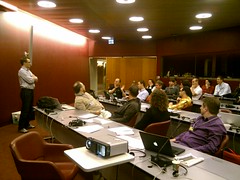LIFT10: Hacking Venture Capital, Fred Destin
 Hacking Venture Capital, Fred Destin
Hacking Venture Capital, Fred Destin
Part 1: pitching. Part 2: negotiation
Fred is a VC focused on early-stage funding for consumer-facing innovation: e-commerce, digital media. Moving back to the US, he's the only guy left in Europe.
We split into groups of 4 and work out how to pitch a fake company; a few groups pitch; we get harsh feedback.
Our group got up and pitched a fake version of Seedcamp winner ERPLY. Feedback on our pitch:
- Introduction was boring; everyone knows the small business market is huge. Liven it up with a personal anecdote, perhaps. I did this bit, and completely failed to use a great line one of the guys in our group came up with: "We're SAP for small businesses";
- We pitched our use of Amazon as a competitive advantage; this didn't add anything and wasted time;
- We didn't have a clear conclusion;
- Asking for investment in exchange for a stated 30% investment was poor practice;
A pitch is all about honing the story. To get good terms, you need multiple offers; to get multiple offers you need to tell a good story to several investors at the same time. Investors buy stories not businesses: they fall in love, then post-rationalise. You should be able to summarise your company on the back of a business card.
A decent elevator pitch is also a good tool for sharing a vision internally: it's a recruitment tool.
You don't need a business plan, executive summary or NDA. I've never heard of an NDA being enforced.
You need introductions (through an investor/entrepreneur); a high-concept pitch (3 words: "flickr of video"); a bottom-up, assumptions-driven model with any real numbers you can get in there. A model that an investor can play with and stress-test. An operating plan for next 12 months. Very clear milestones and deliverables. An explicit technical roadmap (not engineering documents, an outline). 10, 15, 5 KPIs by which success is measured (read Dave McClure, etc.). A cap table. Possibly credible market sizing.
Presentation doesn't matter; real-world traction is the most important thing. You're selling yourself: use social proof, if you don't have money you can find it in the ecosystem.
Elegance of product is important.
Tell a story; release your inner actor; smile; be true to yourself; raise pulse levels. Practice, practice, practice.
Let the audience have "aha" moments, so they feel they're smart and discovering things about your business. You're not allowed to have doubts about the team though.
In Europe, we have a tendency to be so fucking humble... err on the side of being salesy.
Embrace "pitch decay" - initial excitement decays over time. This is why you need to leave people with key takeaways. The VC you persuade will be your champion, and is now your sponsor - help him, make his life easy.
Be Israeli: doors close, come in through the window. 3-5 days after a meeting, follow up. No answer? Wait 2 days, follow up. VCs are busy and forget things, don't take it personally. Be pleasant enough that a VC could happily spent 8 hours stuck with you at an airport.
Part 2: negotiation
We split into teams of two: one team is investors, another entrepreneurs. They get different information on the company and their needs and negotiate. This was fun :)
Real-world valuations: they want to own 20-25% of any investment. So what's a reasonable price?
The only thing that really matters is price per share: bring it back to this every time. Option pools are important to build strong teams and legitimate but affect this.
Don't let investors tell you the size of the option pool (though they can provide useful input). Use a hiring plan to justify a small option pool, increase your share price and increase your effective valuation. Underestimating the size of the option pool is a classic mistake.
Liquidation preferences are designed to push the valuation hurdle out and ensure investors get their money back.
Boards are important. Companies are benevolent dictatorships; the board exists to ensure he's optimally benevolent. The CEO works for the board. Bad dictators get beheaded...
Legals are designed to cover a downside - you get run over by a bus and investors end up dealing with your heir. Don't take them personally. Secure the social contract: companies always go wrong at some point, and big companies have big problems. Documents don't help here, but a social contract will.